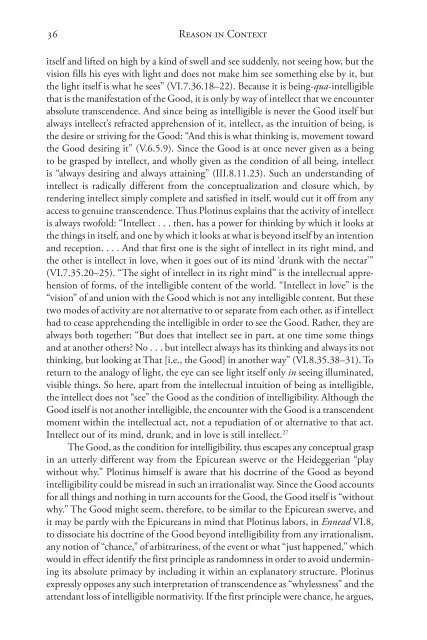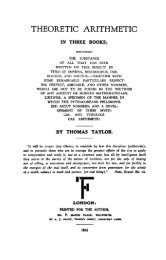Perl - The Good of the Intellect.pdf - Platonic Philosophy
Perl - The Good of the Intellect.pdf - Platonic Philosophy
Perl - The Good of the Intellect.pdf - Platonic Philosophy
Create successful ePaper yourself
Turn your PDF publications into a flip-book with our unique Google optimized e-Paper software.
36<br />
Reason in Context<br />
itself and lifted on high by a kind <strong>of</strong> swell and see suddenly, not seeing how, but <strong>the</strong><br />
vision fills his eyes with light and does not make him see something else by it, but<br />
<strong>the</strong> light itself is what he sees” (VI.7.36.18–22). Because it is being-qua-intelligible<br />
that is <strong>the</strong> manifestation <strong>of</strong> <strong>the</strong> <strong>Good</strong>, it is only by way <strong>of</strong> intellect that we encounter<br />
absolute transcendence. And since being as intelligible is never <strong>the</strong> <strong>Good</strong> itself but<br />
always intellect’s refracted apprehension <strong>of</strong> it, intellect, as <strong>the</strong> intuition <strong>of</strong> being, is<br />
<strong>the</strong> desire or striving for <strong>the</strong> <strong>Good</strong>: “And this is what thinking is, movement toward<br />
<strong>the</strong> <strong>Good</strong> desiring it” (V.6.5.9). Since <strong>the</strong> <strong>Good</strong> is at once never given as a being<br />
to be grasped by intellect, and wholly given as <strong>the</strong> condition <strong>of</strong> all being, intellect<br />
is “always desiring and always attaining” (III.8.11.23). Such an understanding <strong>of</strong><br />
intellect is radically different from <strong>the</strong> conceptualization and closure which, by<br />
rendering intellect simply complete and satisfied in itself, would cut it <strong>of</strong>f from any<br />
access to genuine transcendence. Thus Plotinus explains that <strong>the</strong> activity <strong>of</strong> intellect<br />
is always tw<strong>of</strong>old: “<strong>Intellect</strong> . . . <strong>the</strong>n, has a power for thinking by which it looks at<br />
<strong>the</strong> things in itself, and one by which it looks at what is beyond itself by an intention<br />
and reception. . . . And that first one is <strong>the</strong> sight <strong>of</strong> intellect in its right mind, and<br />
<strong>the</strong> o<strong>the</strong>r is intellect in love, when it goes out <strong>of</strong> its mind ‘drunk with <strong>the</strong> nectar’”<br />
(VI.7.35.20–25). “<strong>The</strong> sight <strong>of</strong> intellect in its right mind” is <strong>the</strong> intellectual apprehension<br />
<strong>of</strong> forms, <strong>of</strong> <strong>the</strong> intelligible content <strong>of</strong> <strong>the</strong> world. “<strong>Intellect</strong> in love” is <strong>the</strong><br />
“vision” <strong>of</strong> and union with <strong>the</strong> <strong>Good</strong> which is not any intelligible content. But <strong>the</strong>se<br />
two modes <strong>of</strong> activity are not alternative to or separate from each o<strong>the</strong>r, as if intellect<br />
had to cease apprehending <strong>the</strong> intelligible in order to see <strong>the</strong> <strong>Good</strong>. Ra<strong>the</strong>r, <strong>the</strong>y are<br />
always both toge<strong>the</strong>r: “But does that intellect see in part, at one time some things<br />
and at ano<strong>the</strong>r o<strong>the</strong>rs? No . . . but intellect always has its thinking and always its not<br />
thinking, but looking at That [i.e., <strong>the</strong> <strong>Good</strong>] in ano<strong>the</strong>r way” (VI.8.35.38–31). To<br />
return to <strong>the</strong> analogy <strong>of</strong> light, <strong>the</strong> eye can see light itself only in seeing illuminated,<br />
visible things. So here, apart from <strong>the</strong> intellectual intuition <strong>of</strong> being as intelligible,<br />
<strong>the</strong> intellect does not “see” <strong>the</strong> <strong>Good</strong> as <strong>the</strong> condition <strong>of</strong> intelligibility. Although <strong>the</strong><br />
<strong>Good</strong> itself is not ano<strong>the</strong>r intelligible, <strong>the</strong> encounter with <strong>the</strong> <strong>Good</strong> is a transcendent<br />
moment within <strong>the</strong> intellectual act, not a repudiation <strong>of</strong> or alternative to that act.<br />
<strong>Intellect</strong> out <strong>of</strong> its mind, drunk, and in love is still intellect. 27<br />
<strong>The</strong> <strong>Good</strong>, as <strong>the</strong> condition for intelligibility, thus escapes any conceptual grasp<br />
in an utterly different way from <strong>the</strong> Epicurean swerve or <strong>the</strong> Heideggerian “play<br />
without why.” Plotinus himself is aware that his doctrine <strong>of</strong> <strong>the</strong> <strong>Good</strong> as beyond<br />
intelligibility could be misread in such an irrationalist way. Since <strong>the</strong> <strong>Good</strong> accounts<br />
for all things and nothing in turn accounts for <strong>the</strong> <strong>Good</strong>, <strong>the</strong> <strong>Good</strong> itself is “without<br />
why.” <strong>The</strong> <strong>Good</strong> might seem, <strong>the</strong>refore, to be similar to <strong>the</strong> Epicurean swerve, and<br />
it may be partly with <strong>the</strong> Epicureans in mind that Plotinus labors, in Ennead VI.8,<br />
to dissociate his doctrine <strong>of</strong> <strong>the</strong> <strong>Good</strong> beyond intelligibility from any irrationalism,<br />
any notion <strong>of</strong> “chance,” <strong>of</strong> arbitrariness, <strong>of</strong> <strong>the</strong> event or what “just happened,” which<br />
would in effect identify <strong>the</strong> first principle as randomness in order to avoid undermining<br />
its absolute primacy by including it within an explanatory structure. Plotinus<br />
expressly opposes any such interpretation <strong>of</strong> transcendence as “whylessness” and <strong>the</strong><br />
attendant loss <strong>of</strong> intelligible normativity. If <strong>the</strong> first principle were chance, he argues,
















